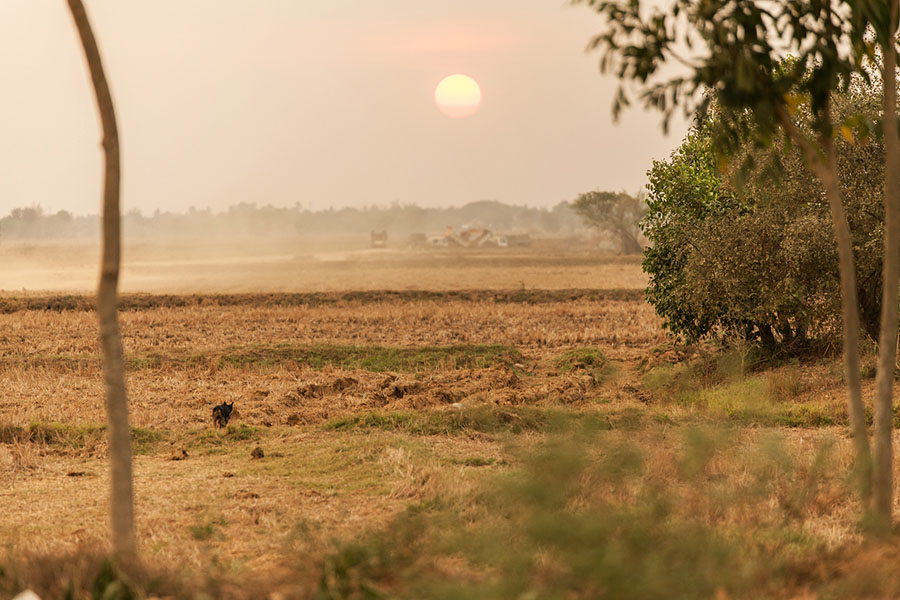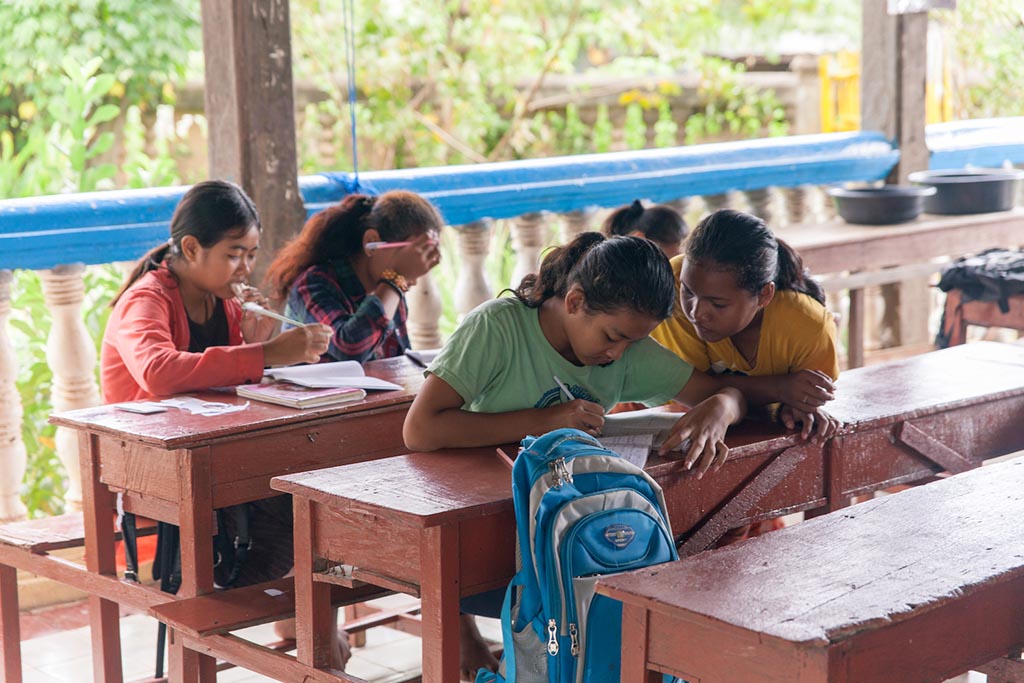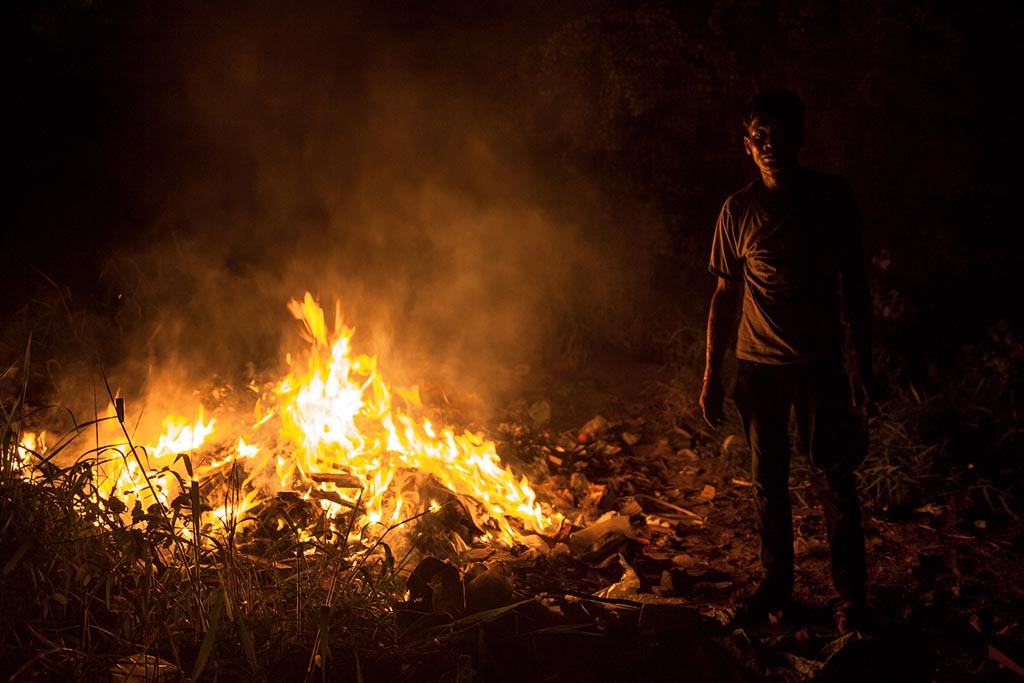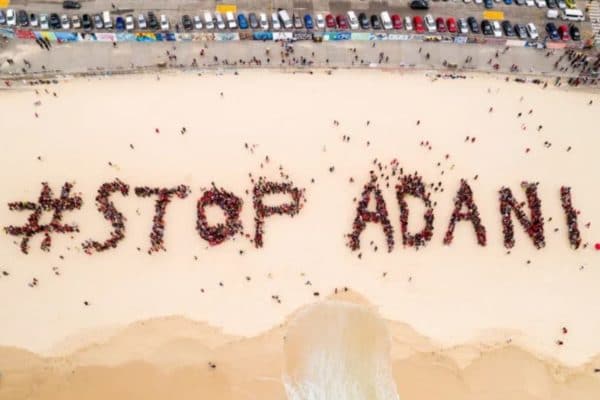It’s 7am and I’ve just woken up to searing heat.
The day will get hotter; at its peak, it will reach 42 degrees. It has been the same all month. The unusually hot weather is making it harder to work. We’ve been waiting for the rains to start. The water has long been running out.
This is what it has been like on the ground in rural Cambodia.
Over the past 6 months, another drought has hit the country after the “one in one hundred years” drought of 2015/16. Cambodia, largely run on hydroelectricity through Chinese-owned dams, has been facing constant power blackouts. With the changing climate and booming Chinese construction in the capital, there hasn’t been enough water to get the country through.

Image above: Cambodia’s drying fields, as Chinese development begins in the distance. The urbanizing of farm fields will create ensure there is less land for food and push farming further into the arms of illegal logging to make room for new land.
Our villages have had months of power cuts. Places that only came into electricity a couple of years ago have had to watch it disappear. We use it only minimally but it’s important. It powers fans in classrooms full of kids in the new, sweltering heat. Those classrooms have now only been open for morning sessions.

Classrooms like that this are semi-outdoors are nearly impossible with the increased heat, power cuts and lack of fan cooling sp they are closing after morning sessions for the day.
We have never had running water here but without water in any ponds or catchments, hydration and sanitation have become extremely difficult. Businesses have had to close regularly too. The government advised locals to buy generators that were accessible only to the wealthy. Demand, of course, saw their prices skyrocket. Who will be measuring the impacts of this on a generation?
At night, we stare at the skies wondering if they’ll crack. As our eyes lower, we watch trucks crammed full of people head for the border. Though we have always had temporary economic migration into Thailand, these people are unlikely to return.
Earlier in the year, the government issued requests that farmers not plant a second rice crop this year; rice is too water intensive. With the drought and the heat, many of the other crops struggled too. In our region harvests were down 30 – 50%. That’s nearly half the amount of food to eat. Half the amount of food to sell.
For farmers that has meant the end to a lifetime of work. Having gone into debt for small loans to buy more water for their crops, or new fertilizers or chemicals that might see them through, the low harvest means those microloans cannot be repaid.
In the south, these farmers end up in the brick kilns; traded in for slave labor. They are bonded by their debt and their children will inherit it. Where we work, there is an option of escape. In the hope that they can survive on the other side of the invisible border we drew, illegal migration is a way out. We would call these climate refugees.
Cambodia relies on its farmers and its farmers rely on generations of knowledge that have been passed down through the seasons. Steady weather that can be predicted each week. That has all changed of course.

Everybody burns plastic here, everywhere & all the time. You inhale it as you make your way around the villages. Burning of plastics also contributes to the effects of climate change as it releases dangerous gases into the air.
In the workshops, we run mothers speak of the fits their children get when deep dehydration kicks in. Worry dances heavily across their faces when they open up about their husbands and the future. Water might well be the reason for our next big wars.
Only a few weeks ago an unimaginable weather event tore through the rice fields; one that can only be described as a tornado. Such storms are not common here. Not one local recalled ever seeing such a force throughout their life. Certainly, I have never witnessed one during nearly ten years of work here.
Bolstered by a strong El Niño season (experts suggest these events are intensifying due to climate change) and the increasing influence of our warming planet, the weather is changing. It is the only thing anybody is talking about. In our environmental workshops time and time again the unpredictability of the weather is raised. All the knowledge that exists here means nothing when the climate changes.
Over the past decade, I’ve watched many of these places slowly raise themselves out of extreme poverty. Devastatingly I am now watching them regress.
Ultimately, the impacts of the developed world on Cambodia are nigh on irreversible.
Cambodia has been changed. It continues to change. The impact of climate change and local deforestation on this highly vulnerable country is effectively inevitable. Suffering for the people however, is not. We have a chance to alleviate this burden if only we all decide to do so.


